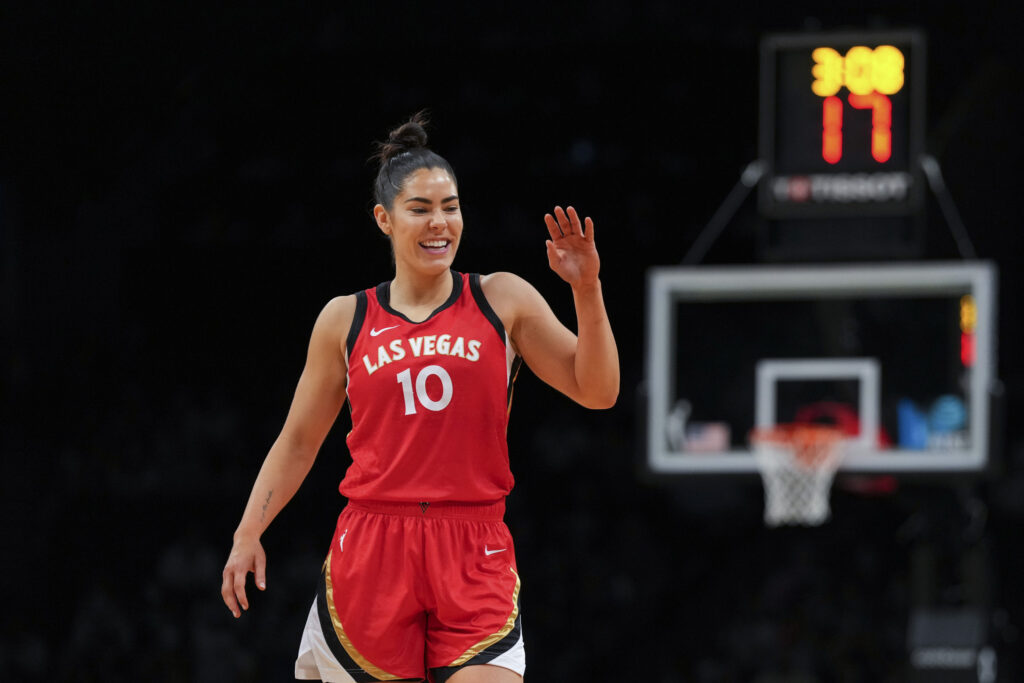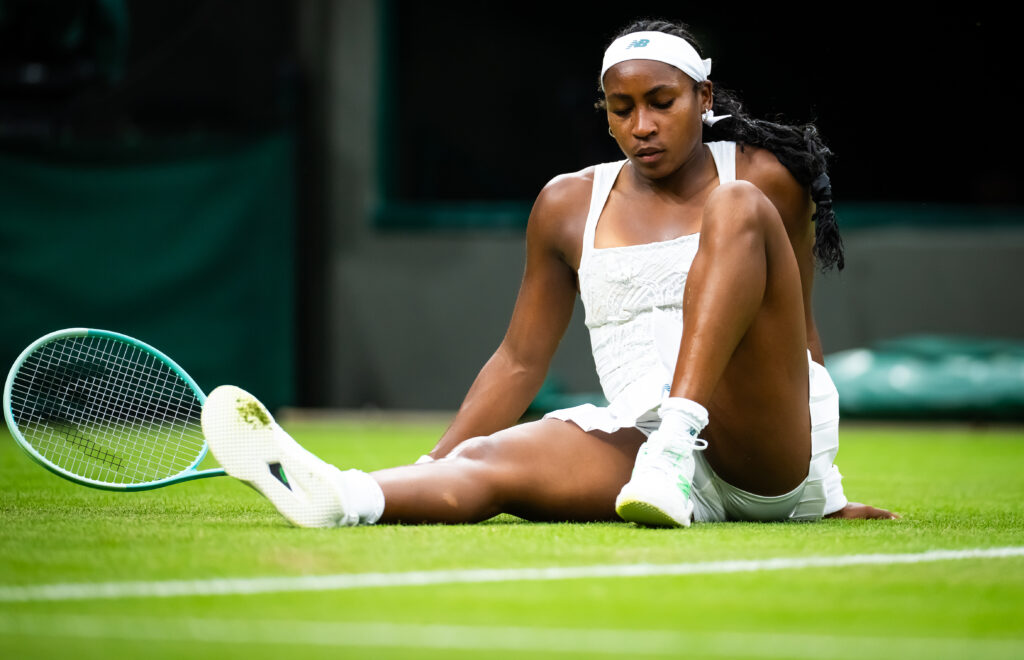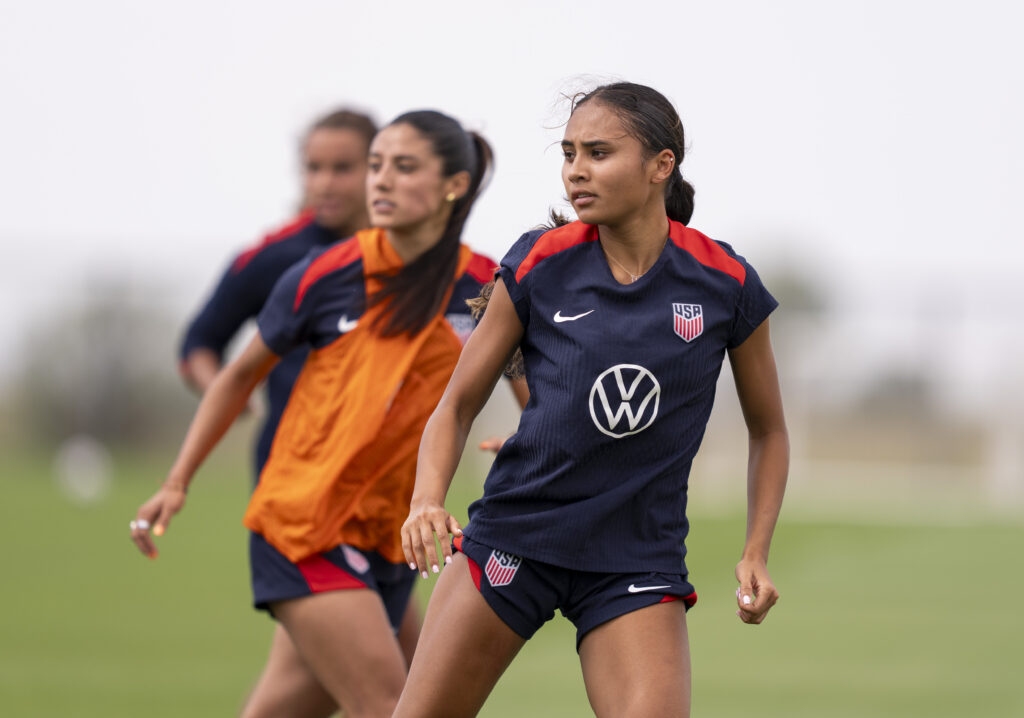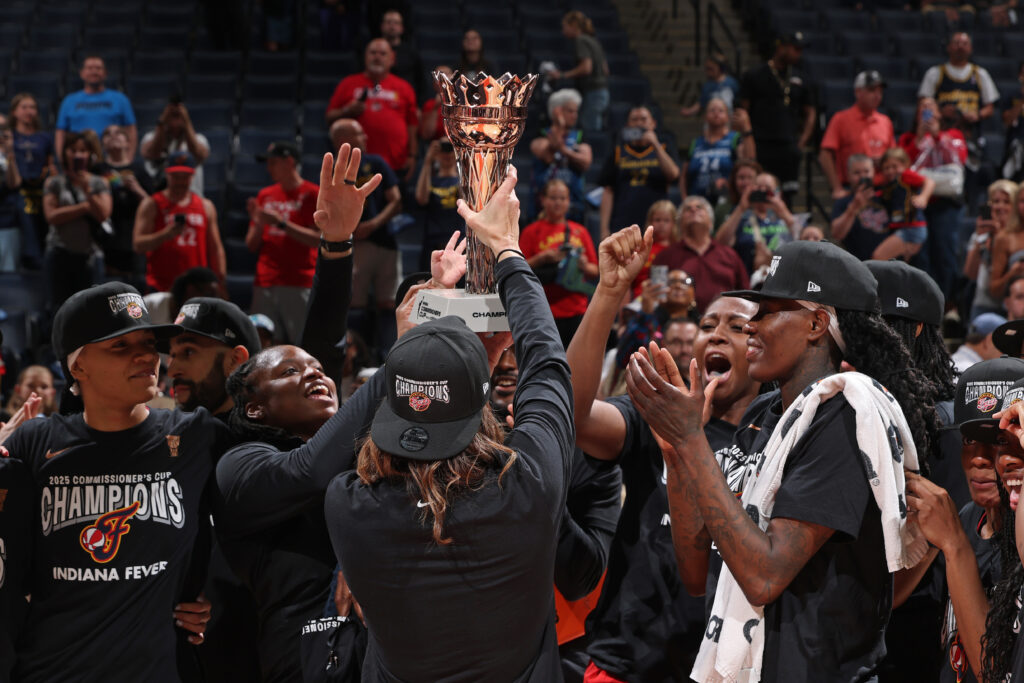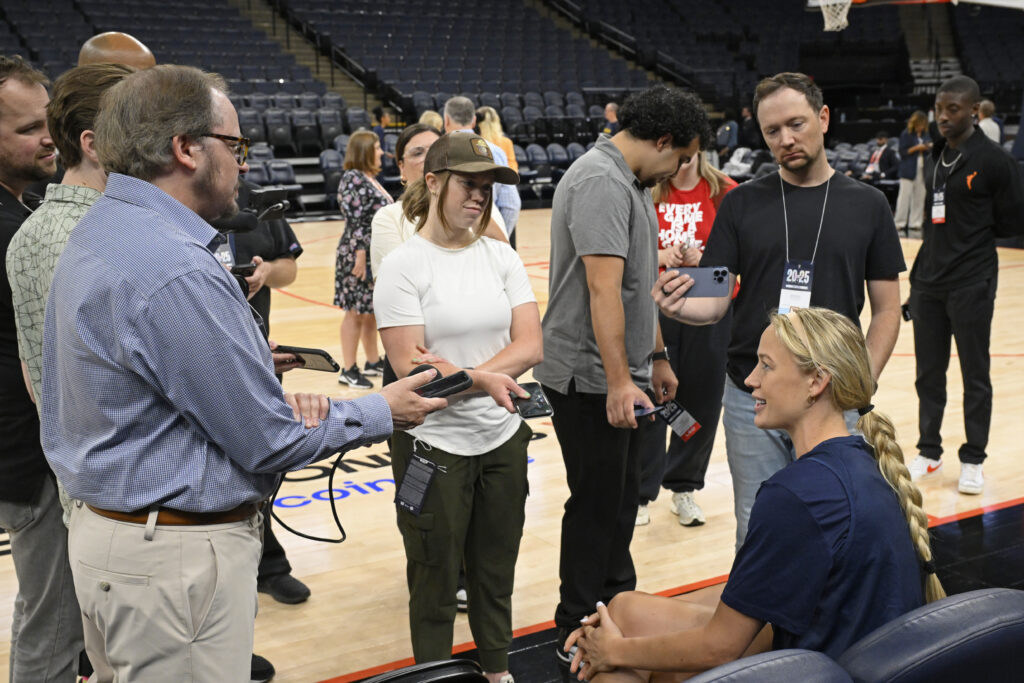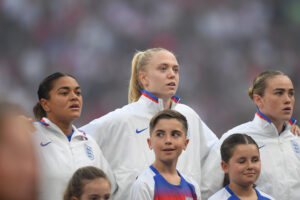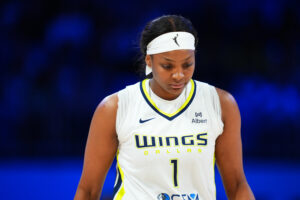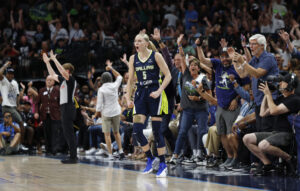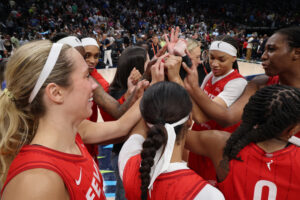At 9 years old, Kelsey Plum found herself on the couch, locked into an infamous rivalry game between UConn and Tennessee on TV. Something about the prestige of the matchup, the competitiveness of the game and the aura of Diana Taurasi instantly grabbed her focus.
“At that moment, I started playing basketball,” she says.
Her newfound interest quickly turned into a love as Plum began tagging along with her father to pick-up games, where nobody treated her any differently because of her age or her gender.
“He would tell the guys, ‘Listen, I know she’s my daughter, but treat her like I don’t know her. Beat her up, foul her, block her shot. Whatever you need to do, but don’t go easy on her.’ My dad used to say, ‘If you don’t make shots, we’re going home early.’”
When she was 10 years old, with unwavering confidence, Plum plotted her future.
“I told my mom, ‘I just want to let you know I’m going to be playing in the WNBA,’” she recalls.
“She’s got an ability to laser focus on what’s important now, better than anybody that I’ve ever been around,” says Mike Neighbors, Plum’s college coach. “She can focus and eliminate all the noise and lock in on what’s important. I have never seen a person do it the way she does.”
Seventeen years later, a 10-year-old’s premonition came true. After a record-setting collegiate career at the University of Washington, Plum entered the WNBA in 2017 as the No. 1 overall pick and is now playing the best basketball of her career in her fifth season with the Las Vegas Aces. Earlier this month, she was named All-Star Game MVP in her first appearance.
If you look past the awards and the stat lines, you’ll notice something about Plum this year. Beneath her big smile is an inner peace, and it’s shining through in every facet of her life, especially on the basketball court.
But, as she’ll tell you, that hasn’t always been the case.
Chasing the record
Kelsey Plum remembers the chatter, even when she wasn’t really listening for it.
In the fall of 2016, Plum’s senior season at Washington, she started to close in on the 16-year-old Division I all-time scoring record set by Missouri State’s Jackie Stiles. With each game-high performance and monster scoring night — 44 points against Oregon in December, another 44 against Stanford in January — the inevitability of the feat set in.
On Feb. 25, 2017, in Washington’s last game of the regular season, Plum scored 57 points against Utah on her senior night to reach 3,397 points for her career. The NCAA’s new Division 1 scoring leader was also on her way to breaking the single-season scoring record and sweeping every major Player of the Year award while the Huskies marched to their seventh Sweet 16.
Plum averaged 31.7 points on 53 percent shooting from the field and 43 percent from the 3-point line to finish the season with 1,109 total points. Leaving Washington with 3,527 career points, she remains the NCAA’s all-time scoring leader to this day.
In April 2017, the WNBA beckoned. Plum was the consensus No. 1 pick, the future face of the San Antonio Stars. Her career lay ahead of her, just as she’d envisioned it 12 years earlier. And yet, when Plum closed her eyes, something wasn’t right.
“In college, people really noticed all the records and accolades and all the stuff broken, but I was really hurting in terms of my identity and trying to figure out who I was as a person at that time,” she says.
Plum’s pursuit of the career scoring record was the single biggest story in women’s basketball that season, becoming so intoxicating that it took on a life of its own for the senior guard.
“It was all people cared about, you know? There was never a, how am I doing? And it’s not anyone’s fault, it’s human nature,” Plum says. “You see something happening like that and people assume life is great because, you could argue, I probably played one of the best individual years of basketball of all time.”

Plum stayed private off the court as she suffered with anxiety, depression and heavy suicidal thoughts. She was taking antidepressants to get her through the day, and sleeping pills to get her through the night. In between, she was switching on and off of different medications, in search of any form of relief.
“I was living on the edge in terms of just trying to make it through the day. It was brutal,” she says. “I want to be clear that this is not anybody’s fault. Nobody knew I was hurting. I didn’t tell anyone that I was hurting.”
Neighbors, Washington’s head coach, only knew that he wanted to divert as much attention as he could from Plum and the record chase back to the team.
“As a team we tried not to focus on it — everybody else was already doing it,” says Neighbors. “We wanted to focus on our team goals, as we had a lot of pressure on us that season trying to get back to the Final Four.”
While Plum put her head down with the team that season, deep down she continued to suffer.
“It was like the better I did at basketball, the worse I felt on the inside. It was like my identity felt completely gone,” Plum says. “I was just known as the girl that was going to break the record, and that was it.”
Handling the national spotlight
At first, the cameras seemed like a good idea.
During Plum’s senior season, she and the Washington coaching staff had agreed to an in-depth documentary that would tell Plum’s story and pull back the curtain on her history-making season. As the production got underway, they quickly started to realize what was being asked of them was more than they’d signed up for, and that the intent of the film was shifting.
“I had TV cameras following me around on campus, I was on ESPN every other week, I had extra security hired because I would get ambushed at games,” Plum says. “For the first time in my life, I was like, woah, this happened so fast. I don’t even know how to deal with it.”
Back in 2017, Washington and other college programs across the country didn’t have the mental health resources and support staffs that teams do now. As the spotlight on Plum grew brighter, they didn’t have much to rely on outside of themselves.
“That documentary turned out completely different than we had been led to believe, and then the extra security needed,” Neighbors says. “It’s not that we wanted to do it, it’s that there was a need for it.”
Even as Plum’s senior season wound down, her life did not. In a span of eight days, Plum was in eight cities accepting national awards, negotiating professional deals, attending the Final Four, and walking onto the stage at the WNBA Draft in New York City before turning right around to pack and leave for San Antonio.
Plum put her studies on pause for the final quarter of school (she eventually finished her degree while playing professionally in Turkey). It was a lot for anyone to bear, let alone have time to process mentally.
“She had no chance to be a college senior,” Neighbors says. “Those are grown adult decisions and interactions, and as much as you want to think you’re grown, you’re not grown at that age.”

Transition to the WNBA: The battle continues
On the night Plum was selected as the No. 1 pick in the draft, while her family and friends went out to celebrate, she retreated to her hotel room to lay down.
“I was in just a very dark, dark place,” Plum says.
The expectations followed Plum to San Antonio and enveloped her. After she rolled her ankle in training camp and missed the first three games of the season, she forced herself to try to come back too soon. In her WNBA debut against the Dallas Wings on May 25, she scored four points in just over 12 minutes.
The Stars started the season with 14 straight losses and went on to finish 8-26 and last in the WNBA standings.
Ahead of the 2018 season, the team moved to Las Vegas and was rebranded as the Aces. After another losing season and missed playoff opportunity, the team started to put it together. Plum did her part on the court, averaging 8.8 points and starting 80 of the 96 games she played across her first three seasons, while the Aces finished fourth in 2019 and advanced to the semifinals.
“I didn’t play terrible. It wasn’t terrible. It just wasn’t what people thought it would be,” she says.
Plum had become a scoring machine her senior year at Washington. There was an expectation that she would produce similar numbers in the pros. When it didn’t happen overnight, a lot of the same people who praised her just months before started to question her abilities.
“You start to realize how much you value other people’s opinion,” Plum says. “When it’s going good, it’s going great, but when it’s going bad, it broke me.
“People were like, ‘What’s wrong with you? Did you forget how to play basketball? I miss the old Kelsey. I miss the Washington Kelsey.’ It was just absolutely brutal.”
Plum’s internal battle raged on as she continued to question her value and identity outside of a game, a record or an expectation.
“I think that you work for something your entire life, thinking that it’s going to bring you that satisfaction, and when you finally get it, you realize it’s the emptiest thing in the world,” she says.
“I just was like, well, what am I even here for? I did everything I was supposed to do, everything everyone told me I should do, and I did it and I feel like just absolute s—t. I don’t even know who I am, I don’t even know what I like to do, I don’t know anything about my value outside of basketball. I didn’t know anything.”

An unexpected blessing
As the Aces headed into the playoffs in 2019 for the first time in five years, Plum felt something shift on the court. Starting three of the five games they played before elimination, she was suddenly playing and shooting more freely. Taking 3.6 more shots a game, she averaged 15.2 points on 49.2 percent shooting from the field and 52.9 percent from 3 while also dishing out 7.8 assists.
But despite the breakthrough in her game, her mental struggles remained.
In June 2020, three years after she’d broken the NCAA scoring record, Plum was preparing for her fourth season in the WNBA and her first Olympics with the United States’ 3×3 team when it all came screeching to a halt. She was playing pick-up basketball in Portland, Ore. when she planted her left foot and felt a pop.
Plum soon learned she had torn her Achilles, an injury that would sideline her from USA Basketball and the Aces for the 2020 WNBA season, played out over three months in a “bubble” in Bradenton, Fla. due to the COVID-19 pandemic. But instead of panicking at the initial diagnosis, Plum felt a sense of peace.
“I remember getting driven to the hospital, and one of my best friends took me and you could tell he was visibly upset,” she says. “I remember looking at him and thinking, you know what, it’s going to be OK. It was almost like a sigh of relief.”
Between her whirlwind senior season at Washington and the grueling year-round WNBA and overseas playing schedule, Plum had been going nonstop for the last five years. The fast-paced lifestyle was all she knew.
“It was like, well, I definitely can’t do anything now, so let me just take a second and take a deep breath. I felt for the first time my life kind of stood still,” she says.
During her recovery, she received some of the best care in the world from top surgeon Dr. Neal ElAttrache, the same doctor who performed Breanna Stewart’s Achilles surgery a year earlier. From there, Plum focused on rest and physical therapy as the 2020 WNBA season carried on without her.
While she physically was on the road to recovery, her life had also finally slowed down. It gave her the opportunity to focus on her mental health. Plum started working with a full-time mental coach, who encouraged her to practice meditation and gratitude and rediscover her spiritual side.
“I knew that when I came back to basketball, the skill was there. I was not worried about that,” she says. “It was me just being able to focus on those other areas. It was kind of just getting everything else full circle so, when I came back, I would be better prepared foundationally.”
Plum also joined Neighbors’ staff that fall at the University of Arkansas, where he’d been hired as head coach days after Plum’s senior season at Washington. Serving as a graduate assistant not only helped her take her mind off the injury, but also allowed her to view the game from a different perspective and make an impact in a new way.
While away from the WNBA, Plum would get phone calls and messages from teammates and friends. They told her that if she’d had to miss a season, the 2020 bubble season was the one, which helped ease her mind.
Two years after the injury, Plum is playing MVP-level basketball. After winning a gold medal with Team USA in the first-ever Olympic 3×3 basketball competition in Tokyo last summer, she’s now leading the Aces in scoring — and is behind only Stewart in the league —with 20.1 points per game on 41.5 percent shooting from 3 and in a career-high 33 minutes per game. With a game-high 29 points in Las Vegas’ 84-66 win over the Sparks on Saturday, Plum helped the Aces clinch a playoff spot for the fourth straight season.
WOOF! WOOF! 🐶
— WNBA (@WNBA) July 24, 2022
Plum-Dawg led all scorers in the Aces' playoff-clinching win over the Sparks 💪@kelseyplum10: 29 PTS, 5 REB, 2 AST, 1 STL pic.twitter.com/trx2lGvfZH
The attention off the court has ramped up again, but she feels far more equipped to handle it. Days after winning All-Star Game MVP, she signed on with GSTQ, a women’s lifestyle and luxury collection, as a brand ambassador.
By sharing her story now, Plum wants to help others facing their own battles with mental health.
“I understand that God has brought me through this, not just to build my character, but to maybe help someone else,” she says. “I know there’s somebody — maybe it’s in this next draft, or not even in basketball, just in life — that’s going through it and maybe doesn’t have to go through it the way that I did.”
When asked what she would tell that somebody, her mind traces back to her lowest points, and what she wished she knew then.
“You can’t do it by yourself. You have to try to build those strong support systems. Your identity can’t be ‘so and so, the basketball player’ because I promise you, it’s not enough. You’ve got to have something else outside of it,” says Plum, who’s rediscovered the joy in spending time at home, visiting with her family and pulling off pranks.
“Finally, remember why you started playing. I lost that joy for a couple years and I think that people saw that. They didn’t mean to say, ‘We miss the Kelsey from Washington.’ They meant to say they miss the creativity and competitiveness and the love of the game. Instead of out there playing scared, or out there playing not to make a mistake, you’ve just got to remember why you started in the first place. I play because I love this game.”
Mental health is a daily journey for Plum. While recovering from her Achilles tear, Plum began to value her quiet time, allowing herself to reflect and refocus on the things that matter most to her. She still journals and writes down 10 things she is grateful for every morning, and then visualizes herself succeeding in whatever the day might bring.
“I feel like it was just a great time of peace and being alone with no noise,” she says. “I thank God for it every day. It’s the best thing that ever happened to me in my career — probably in my life so far.”

A’ja Wilson, the Aces’ No. 1 pick the year after Plum, has watched her evolve over the past five years, through the good and the bad. This season, Plum is living and playing with a joy that, for the first time, isn’t tethered to outside expectations.
“I think she understands that she doesn’t have to prove anything to anyone,” Wilson says. “Once she got past that, I think that’s when the floodgates opened for her. When you have someone that has found themselves on and off the court, that’s what you see in the beauty of her game right now.”
With the help of her daily routines, Plum is focused most of all on being present. When she has a great day at practice or a double-digit scoring night in an Aces win, it’s easy to smile and lift up the people around her. But when she has an off night, that feeling comes just as easily.
That’s how Kelsey Plum knows she’s grounded, and healing with each day.
“I’m having so much fun in life right now. This team is unbelievably fun and wild and it’s just a joy. It’s pure joy,” she says. “I feel like God has given me so much in this life, and in any situation, wherever I am, I feel like I try to bring a light and a joy to life.
“And for the first time in a long time, I feel like myself again.”
Rachel Galligan is a basketball analyst at Just Women’s Sports. A former professional basketball player and collegiate coach, she also contributes to Winsidr. Follow Rachel on Twitter @RachGall.
